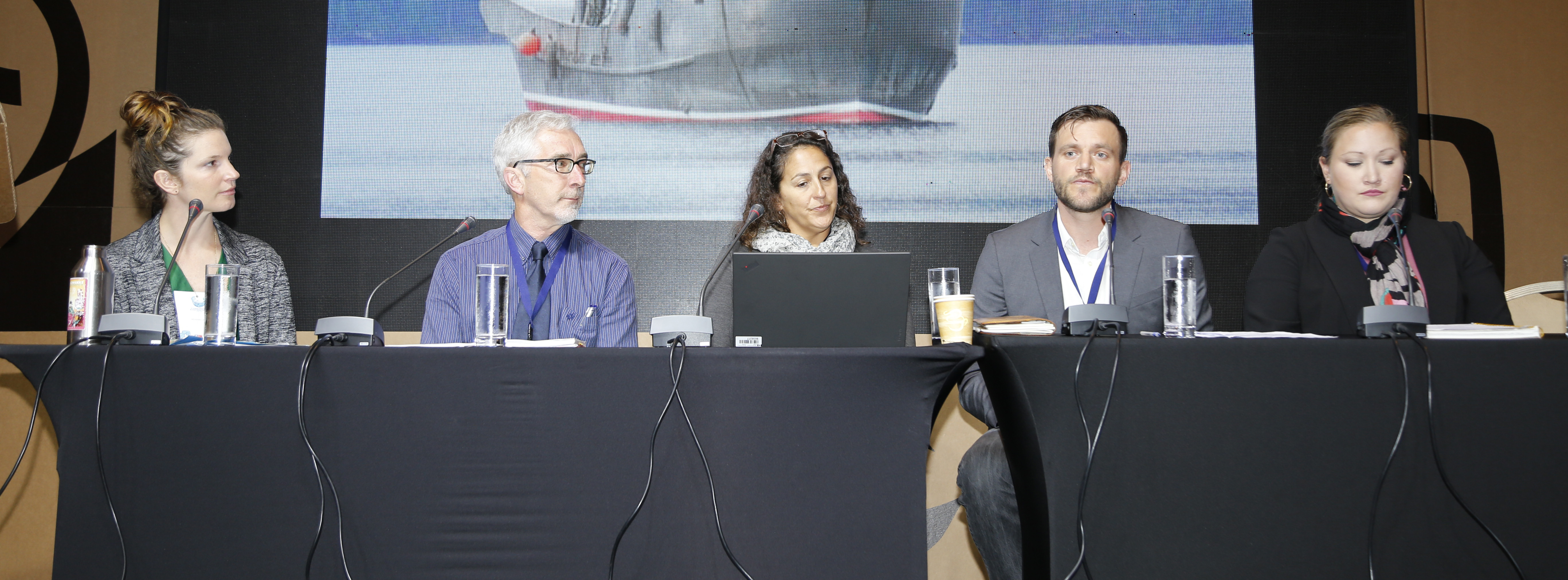
(L-R): Meaghan Calcari Campbell, Gordon and Betty Moore Foundation; Allan Lidstone, Forests, Lands, Natural Resource Operations and Rural Development; Christie Chute, Department of Fisheries and Oceans, Canada; Gord McGee, Central Coast Indigenous Resource Alliance; and Danielle Shaw, Wuikinuxv Nation. Photo by IISD/ENB | Angeles Estrada
Allan Lidstone, Gord McGee and Danielle Shaw represented the Marine Plan Partnership (MaPP) at the International Marine Protected Areas Congress 2017 (IMPAC4) in La Serena-Coquimbo, Chile, held Sept. 4-8 and organized by the Government of Chile and the International Union for the Conservation of Nature’s (IUCN) World Commission on Protected Areas.
The congress allowed international participants to discuss how the management of marine protected areas (MPAs) contributes to progress toward the UN Sustainable Development Goal on the conservation and sustainable use of the oceans, seas and marine resources.
The MaPP representatives, along with Christie Chute of Fisheries and Oceans Canada, took part in a panel discussion chaired by Meaghan Calcari-Campbell of the Gordon and Betty Moore Foundation, titled Indigenous, Provincial, and Federal Governments Integrating Marine Spatial Plans and Marine Protected Areas in Canada. In a wide-ranging discussion, they addressed the benefits of the First Nations-B.C. partnership, the development of the marine plans, the features of the protection management zone designation, stakeholder engagement, integration of traditional knowledge and science, and what comes next as the MaPP partners implement the marine spatial plans, while at the same time working with the federal government to advance a MPA network on the B.C. coast. The audience posed questions about the role of Coastal Guardian Watchmen, how monitoring, compliance and enforcement activities were integrated with the three levels of government, and how Indigenous title and rights influence the planning process and align with legislative or policy tools used to create marine protection by the federal and provincial governments.
Gord McGee, Marine Planner with the Central Coast Indigenous Resources Alliance (CCIRA) and member of the MaPP Central Coast Technical Team, also gave a separate presentation, Marine Planning Partnership in the North Pacific: Meeting 2020 Targets in Canada. He focused on three elements of successful marine plan development: collaboration between the Nations, the provincial government and local governments; the integration of traditional knowledge with scientific and stakeholder local knowledge; and the ability to create solutions for difficult issues as a result of the collaborative and integrative nature of the process. The audience asked questions about the MaPP governance structure and decision-making process, the cost, the advisory stakeholder process and how to engage stakeholders meaningfully, and how the Nations assert authority over three jurisdictions in Canada (federal, provincial and municipal) during planning and how they continue to assert their title and rights.
Allan Lidstone, MaPP Marine Working Group member and Director of the Resource Management Objectives Branch within the B.C. Ministry of Forests, Lands, Natural Resource Operations and Rural Development, and Danielle Shaw, Stewardship Director with the Wuikinuxv First Nation, presented Marine Spatial Planning, MPAs and Collaborative Management in the North Pacific Coast of BC as part of a panel discussion, Meeting the 2020 Targets in Canada: challenges, successes, opportunities and lessons learnt in developing a national network of MPAs over the past 25 years.
Commenting on his experience at the congress, Lidstone said, “I was surprised by the extent of work in progress and completed to put MPAs in place around the globe. The diversity and number of partnerships to support this work was also noteworthy including the important role of private foundations in promoting and funding this work. Other highlights included the rapid advances in technology to support monitoring, compliance and enforcement and distribution of information. Many presenters recognized the critical need of community participation and support to ensure viable MPAs. I noted that many of the commonly identified key factors for success in planning MPAs were consistent with the planning approach we took in MaPP.”
He added, “It was exciting to share our experiences and learning from MaPP. Although there is a lot happening around the globe, I felt our work here in coastal British Columbia elicited a lot of interest both in our presentations and in one-on-one conversations with other participants. This interest reflects that MaPP is at the forefront of marine planning and has established many innovative and effective approaches for sustainable coastal and ocean management.”
McGee commented, “It’s amazing how much work is being done at all scales around the globe. MPAs are really important structures being used effectively far out in the middle of great oceans all the way down to the level of small mangroves or coves.” He felt it was important that the work of MaPP was shared at the conference because it is a strong example of collaborative planning with First Nations and the use of traditional ecological knowledge to drive planning processes along with science. In fact, there was an entire day devoted to Indigenous engagement and the planning process.
One presentation that stood out for McGee was a lecture by a native Hawaiian planner. McGee said, “The planner described how they had designed their planning process to merge with their Indigenous world view, and he sang a song that spoke about each of the different parts of their ocean, the birds, the marine mammals, shellfish and how important each is to their way of life. He went on to describe how they were collaboratively building their marine planning process itself in a radically different way from a traditional western scientific approach. People were really touched by his presentation. It was obvious that the connection to their environment was so important to them on different levels.”
McGee feels same way about his work at home. “In MaPP, there are people, communities, and Nations who are so deeply rooted to this coast for thousands of years, and as a result we are working towards creating meaningful ways of stewarding together, among governments, across cultures in ways that, after being at IMPAC4, I think are globally significant.”
For further information, visit the IMPAC4 website and the International Institute for Sustainable Development (IISD) summary of meeting.
More News »



